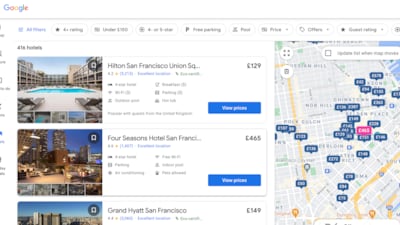A Booking.com global survey released in June laid bare the new expectations of travellers.
Some 83 per cent of 29,000 respondents said they found sustainable travel to be vital, with 61 per cent noting that the pandemic has increased their interest in travelling sustainably.
Half added that finding a hotel with actual eco credibility isn’t easy – and they’re right. Hotels that take sustainability seriously don’t often shout it from the rooftops, while others tout themselves as green by offering an option to skip the daily laundering of linen.
The most significant new tool comes courtesy of Google. As of Wednesday, the search engine will label hotels as “Eco-Certified” in global search results, with a leaf-shaped emblem next to the hotel’s name. Clicking on the “About” tab will detail the property’s specific sustainability practices, such as having water use audited by an independent organisation or using energy from carbon-free sources.
The new feature relies on 29 certification programmes to establish a hotel’s green credibility; the property must have an array of sustainability measures audited by third-party experts. It’ll be up to hotel staff, rather than the search engine, to update hotel listings, using the free Google My Business Profile.
The move is intended to offer travellers more transparency against greenwashing, and also responds to increased search volume around eco-travel buzzwords. The term “green hotel,” for instance, has quadrupled in search volume since March 2020, according to Google Trends.
“We’ve worked in close collaboration with hotels to learn more about how they're approaching sustainability and how to best represent these different approaches within our product,” says Richard Holden, Google’s vice president of product management.
“Standardisation will be key in getting consumers to understand, trust and take action based on the sustainability information we provide.”
EarthCheck is among the strictest of the eco credentials Google will recognise. Created in 2000 by Australia’s Sustainable Tourism Co-operative Research Centre, the benchmarking system is constantly updated according to the latest research. It already works with 550 hotels globally, including the Langham Hospitality Group, which has cut its energy and carbon intensity by one-third since joining the programme in 2011. This month, Belmond, a brand owned by LVMH, announced it would begin the EarthCheck certification process for not only all of its 34 hotels but also its restaurants, cruise ships and trains.
Other notable certifications Google will recognise include Green Key, Leed, Green Seal and Green Globe – all of which have been around for decades – as well as such relative newcomers as the Green Growth 2050 Standard, which since 2015 has been measuring hotels and resorts across 200 sustainability-related metrics.
What Google won’t show are programmes with only self-reported environmental, social and governance data.
Not all hotels that do good work are accredited, though, partially because of cost – the fee for a bronze Green Seal certification for hotels with fewer than 75 rooms starts at $1,500 annually, for example – and because some schemes are overly focused on a single aspect, such as energy efficiency, thus skipping over hotels that concentrate on pro-social endeavours, such as promoting ethical wildlife experiences or investing heavily in their communities.
“It stands to reason that in the context of Covid, people are taking more time to consider what they value in terms of travel and how that impacts the world at large,” says Holden.
“As the travel industry recovers, hotels that can demonstrate a meaningful commitment to sustainability will be well positioned to meet this growing interest from consumers.”

